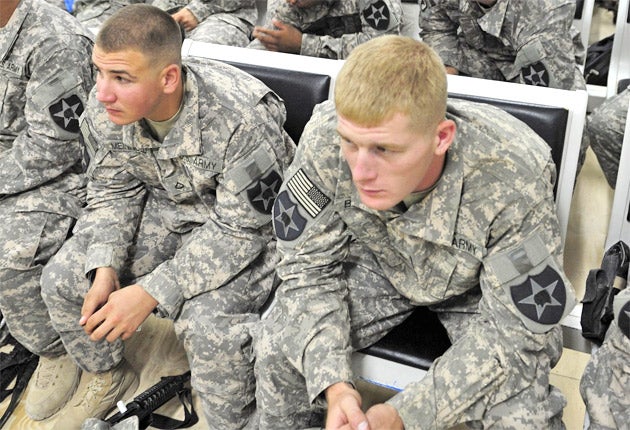Farewell to Iraq, but no talk of mission accomplished
President avoids triumphalism of his predecessor during televised speech

Your support helps us to tell the story
From reproductive rights to climate change to Big Tech, The Independent is on the ground when the story is developing. Whether it's investigating the financials of Elon Musk's pro-Trump PAC or producing our latest documentary, 'The A Word', which shines a light on the American women fighting for reproductive rights, we know how important it is to parse out the facts from the messaging.
At such a critical moment in US history, we need reporters on the ground. Your donation allows us to keep sending journalists to speak to both sides of the story.
The Independent is trusted by Americans across the entire political spectrum. And unlike many other quality news outlets, we choose not to lock Americans out of our reporting and analysis with paywalls. We believe quality journalism should be available to everyone, paid for by those who can afford it.
Your support makes all the difference.Barack Obama last night brought down a curtain on the long, costly and inconclusive war in Iraq, but amid near indifference from a country now worried about the economy to the exclusion of virtually all else.
"It is time to turn the page," the President declared in a prime-time address from the Oval Office – only the second of its kind since he took power in January 2009. "Ending this war is not only in Iraq's interest, it is in our own," he argued. "The United States has paid a huge price to put the future of Iraq in the hands of its people."
The 15-minute speech marked a historic moment, the departure from Iraq of the last US combat forces after a seven-and-a-half-year conflict, costing some $900bn (£585bn), in which 1.5 million US troops have served and more than 4,400 were killed.
But there was no boasting from either the President or his aides of a "Mission Accomplished", as proclaimed by the fateful banner behind George W Bush, Mr Obama's predecessor, when he prematurely announced military victory from the deck of the USS Abraham Lincoln aircraft carrier in May 2003.
"It's not going to be a victory lap. It's not going to be self-congratulatory. There's still a lot of work that we've got to do to make sure that Iraq is an effective partner with us," Mr Obama said earlier at the US army base at Fort Bliss in Texas, where he met some of the last combat units to return from Iraq.
The administration is acutely aware of the latest resurgence of violence in Iraq, and of the political deadlock that has prevented the formation of a new Iraqi government since the stalemated general election in March.
Indeed, as Mr Obama delivered his address, Vice-President Joe Biden was in Baghdad, ostensibly for a "change of mission" ceremony but above all to put new pressure on Iraq's leaders to settle their differences.
Prime Minister Nouri al-Maliki proclaimed Iraq's "independence" in a television address yesterday. "Our security forces will take the lead in ensuring security and safeguarding the country and removing all threats that the country has to weather, internally or externally," Mr Maliki said.
Even with combat troops gone, and 2003's "Operation Iraqi Freedom" replaced by "Operation New Dawn," 50,000 US soldiers will remain – some to conduct counterterrorism operations against a still threatening al-Qa'ida organisation in Iraq, but mainly to train Iraqi forces to take full charge of the country's security. In theory, that moment will arrive in 16 months when the last of the hold-over force is scheduled to leave. By the end of next year, all of our troops will be home," the President re-iterated in his regular weekly radio address last Saturday.
However doubts are widespread whether this deadline can be met – not just among Iraqi politicians fearful that a complete US departure will leave a dangerous security vacuum, but also among Iraq specialists here who believe that, like it or not, Washington will be entangled in Iraq for years.
"The US may be announcing the 'withdrawal' of its combat forces," Anthony Cordesman, of the Centre for International and Strategic Studies think- tank, said yesterday. "The fact is though that the US withdrawal is far from over, the Iraq war is not over, it is not 'won,' and any form of stable end state in Iraq is probably impossible before 2020," he warned.
Even so, the President insisted last night that by ending America's combat mission, he was fulfilling a key campaign pledge, to end a war he opposed from the outset, even before Mr Bush launched the US-led invasion in March 2003. His challenge now is to secure some credit from this achievement, not only domestically, but in a Muslim world increasingly disillusioned with him.
At home, Iraq may be winding down, but the even more protracted war in Afghanistan intensifies. Most important, the stumbling economy and the worsening jobs market are now virtually the only things that matter to US voters, who are set to give Mr Obama's Democrats a drubbing in November's mid-term Congressional elections.
In his prime-time speech, the President acknowledged as much. "Today, our most urgent task is to restore our economy, and put the millions of Americans who have lost their jobs back to work," he said, according to excerpts of the address released beforehand by the White House.
For Mr Obama's audience in the Arab world meanwhile, the pull-out of combat troops from Iraq must be set against his failure to close the prison at Guantanamo Bay, and the lack of progress in the Middle East.
Join our commenting forum
Join thought-provoking conversations, follow other Independent readers and see their replies
Comments